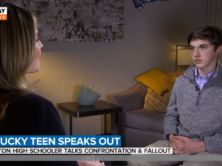Florida Atlantic University's student-run newspaper, the University Press, ran an issue called "the Unethical Press" to illustrate journalism ethics. (Credit: University Press)
One Florida college newspaper violated as many tenets of the Society of Professional Journalists’ ethics code as possible in its most recent issue.
But, they did it on purpose. The newspaper, Florida Atlantic University’s University Press, renamed itself the Unethical Press for one issue in honor of SPJ’s Ethics Week. Funded by the local SPJ chapter’s $200 grant, the staff and its editor for this issue, Alyssa Cutter, put together an issue that featured intentional plagiarism, Photoshopping, and bribery.
“Ethics Week is the last week of April each year,” SPJ executive director Joe Skeel told iMediaEthics via e-mail.
“Ethics can be fun, people can still respect you and laugh with you and not at you, you don’t have to be serious to be taken seriously,” the newspaper’s volunteer adviser Michael Koretzky told iMediaEthics.
See the issue here. The issue featured examples of Photoshopped images, anonymous sources, and gifts to reporters. Accusations made in the bogus stories included that the school mascot (an owl) was a “sex-crazed murderer” and that a two-year-old was arrested for “shanking” a senior citizen — complete a photo of a toddler with a bandanna and knife. The SPJ’s ethics code was re-printed in part next to stories and in full early on in the issue.
Teaching General Audience
The University Press (and the Unethical Press issue) isn’t published for or by FAU’s communications school either. Distributed across campus and with a newsroom of about half communications students and half other disciplines including biology, the newspaper’s staff strove to teach ethics across a wide audience — especially to people who didn’t know that journalists have ethics, Cutter explained.
“We had some good feedback on it from what I understand,” Cutter said.
The reaction from the general university public was “I didn’t realize you had so many ethics,” Koretzky described. “I think people were surprised to find journalists have that many ethics. In that sense, it was successful, and what I’m hoping to do is evangelize and get other schools to do this next year.”
Koretzky said he was “happy” to see the entire staff — photographers and graphic designers included — get involved in the issue.
“The graphic designers, the photographers, those are the ones when you discuss ethics traditionally, their corneas glaze over first,” Koretzky commented. While they understand Photoshopping excessively is bad, they don’t ordinarily get how expansive ethics is, he said.
A headline that fits the allotted space, but doesn’t match what the story says? OK for the Unethical Press, Koretzky said to the surprise of designers.
April Fool’s Issues
Besides teaching ethics to the university audience, the University Press was able to use the issue to avoid running the often-debated April Fool’s Day issue. On April Fool’s issues, Cutter commented: “They’re often hurtful and stupid and they can actually get colleges and universities in trouble when they’re published, so we were doing a spin on that as well.”
Likewise, Koretzky said The Unethical Press “was a good idea because we could teach ethics and satisfy students’ need to do parody-like stuff, and it’d be done for good instead of evil.”
Koretzky, who is also president of the South Florida chapter of the SPJ, pitched the idea to students. “It sounded really cool and it was really cool, but it was a lot of work,” Cutter said.
Cutter, who has worked as features editor, explained that the staff was “trying to come up with ideas for what we could do for Ethics Week and our adviser said ‘Why don’t we create an issue called the Unethical Press and break as many rules as possible?’ It was that sentence that started the whole thing.”
The newspaper got the OK from those they mocked before running the issue, Cutter said — just to make sure the issue would go off without a hitch.
Like the university’s president Mary Jane Saunders. The Unethical Press claimed she “may not be the kind old lady we thought” and is perhaps instead a Hulk-like figure. The story was accompanied with a doctored photo of Saunders with a green body.
“We told her she’d be a super hero and she was on board with it,” Cutter said, adding that “it was kind of encouraging” that the administration was OK with the issue. “Not that we needed their permission, but we wanted them to be aware of what we’re doing — at least this time,” Cutter commented.
How to be Unethical
“Being unethical was not easy, I think is what we learned,” Koretzky said.
In brainstorming the issue, Cutter said “if you thought of a cool idea, you had to think of as many ways possible to break the code. If you only hit on one or two things, we tossed it out. We tried to get the most bang for our buck because we only had so many pages.”
Cutter explained that while the newspaper tried to violate all of the tenets of the SPJ’s code of ethics, it was hard because some parts are more abstract. Cutter asked “how do you show” some of the codes? For example, some parts of the SPJ ethics code were hard to violate and explain to readers:
- “Tell the story of the diversity and magnitude of the human experience boldly”
- “Give voice to the voiceless”
“Even some of the ones we hit would be kind of hard for people to understand, just from the fact that sometimes people don’t understand how journalism works. I find myself explaining to my parents a lot what exactly it is I’m doing,” Cutter said.
And, even with the codes that were easier to break, the staff still had to be creative and careful in crossing the line. Case in point: When Cutter was trying to find a way to plagiarize, she said she had to be careful to pick something from the public domain.
“My adviser was making fun of me because I couldn’t figure out how to plagiarize,” Cutter explained. “Even if we took something from the copyrighted material, we could still get sued.”
Cutter ended up using part of Martin Luther King, Jr.’s “I Have a Dream” speech.
Making Ethics Training Fun
Koretzky told iMediaEthics that he wanted to find some way of making ethics teaching “participatory” and fun. Besides teaching the University Press about journalism ethics, “the other purpose was not just to train journalists,” Koretzy said. “I think one of the biggest problems that journalists have is that most journalism education is just to educate journalists. The public has no idea what the hell we do.”
“I came up with the idea because most ethics training sucks. It’s really boring. Ethics to me is like dentistry — you gotta do it once a year at least. You know you have to do it. You don’t like doing it, and you’re glad when it’s over, you feel good when it’s over, but you don’t enjoy it. That to me is what ethics training is. Usually it’s sitting in a classroom listening to old people talk at you about ethics and putting up entries from the SPJ Code of Ethics on a blue Power Point slide and read it to you like you’re blind.”
Other projects Koretzky has put on include Ethics Hold ‘Em, a card game of ethics code items in the style of Texas Hold “em.
Koretzky said he has more difficulty pitching some of these less traditional ideas outside of FAU. At FAU, “they’re accustomed to that.” For example, “next month, we’re putting out an issue of the newspaper without any computer.”
“I know I’m going to get resistance from advisers who just think this is a terrible idea, but I know I’ll get equal resistance from students who think this is not prim and proper…That to me is the most disappointing element of that. College journalists get so nervous that people don’t respect journalists that they decide the way to deal with it is to have no fun at all, which further isolates them from the general public.”
The newspaper and the university have had several conflicts in the past decade. Read here on the Student Press Law Center’s website to learn more about some of the issues the University Press has had with the administration.
For example, last year, the school fired Koretzky, who was a part-time adviser for more than a decade, with three days notice. The school claimed it needed a full-time adviser to “improve and upgrade student media.” He went back to the school shortly thereafter as “the only adult in student media,” though as an unpaid adviser (although even that hasn’t gone over smoothly). The school’s student media director, Marti Harvey, resigned this January.
SPJ to Use “Unethical Press” Idea?
iMediaEthics wrote to the SPJ’s executive director Joe Skeel, who stressed that the Unethical Press project was not a nationally-endorsed or sponsored project. We asked if the SPJ had any plans to market the idea for further teaching, to which he said no.
Skeel added: “In an effort to help you understand how SPJ works, think of it this way…Like a sorority/fraternity, SPJ has chapters all across the country. But like a local campus chapter of a sorority/fraternity, our chapters all have their own identity and projects they do – usually without the knowledge or financial support of the national organization. This is one of those cases.”






